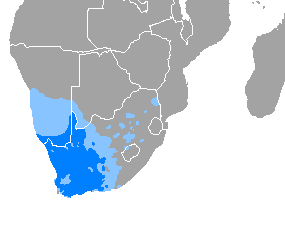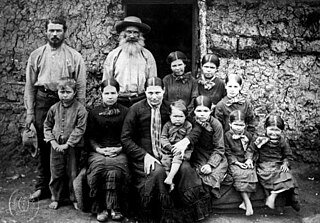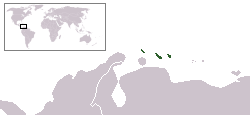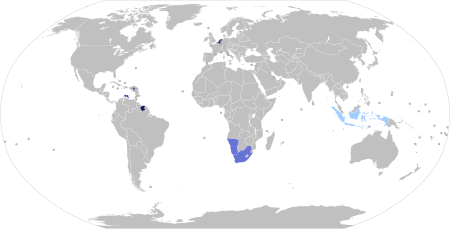
Afrikaans is a West Germanic language that evolved in the Dutch Cape Colony from the Dutch vernacular of Holland proper used by Dutch, French, and German settlers and people enslaved by them. Afrikaans gradually began to develop distinguishing characteristics during the course of the 18th century. Now spoken in South Africa, Namibia and Botswana, Zambia and Zimbabwe, estimates c. 2010 of the total number of Afrikaans speakers range between 15 and 23 million. Most linguists consider Afrikaans to be a partly creole language.

Boers ) are the descendants of the Dutch-speaking Free Burghers of the eastern Cape frontier in Southern Africa during the 17th, 18th, and 19th centuries. From 1652 to 1795, the Dutch East India Company controlled Dutch Cape Colony, but the United Kingdom incorporated it into the British Empire in 1806. The name of the group is derived from "boer", which means "farmer" in Dutch and Afrikaans.

The Netherlands, informally Holland, is a country located in northwestern Europe with overseas territories in the Caribbean. It is the largest of four constituent countries of the Kingdom of the Netherlands. The Netherlands consists of twelve provinces; it borders Germany to the east, and Belgium to the south, with a North Sea coastline to the north and west. It also has a border with France on the split island of Saint Martin in the Caribbean. It shares maritime borders with the United Kingdom, Germany and Belgium. The official language is Dutch, with West Frisian as a secondary official language in the province of Friesland. Dutch, English and Papiamento are official in the Caribbean territories.

South African English is the set of English language dialects native to South Africans.

Papiamento or Papiamentu is a Portuguese-based creole language spoken in the Dutch Caribbean. It is the most widely spoken language on the Caribbean ABC islands, with official status in Aruba and Curaçao. Papiamento is also a recognised language in the Dutch public bodies of Sint-Eustatius and Saba.

The voiceless uvular fricative is a type of consonantal sound that is used in some spoken languages. The symbol in the International Phonetic Alphabet that represents this sound is ⟨χ⟩, the Greek chi. The sound is represented by ⟨x̣⟩ in Americanist phonetic notation. It is sometimes transcribed with ⟨x⟩ in broad transcription.

Limburgish, also called Limburgan, Limburgian, or Limburgic, is a West Germanic language spoken in the Dutch and Belgian provinces of Limburg and in the neighbouring regions of Germany.

The close central rounded vowel, or high central rounded vowel, is a type of vowel sound used in some spoken languages. The symbol in the International Phonetic Alphabet that represents this sound is ⟨ʉ⟩, and the equivalent X-SAMPA symbol is }. Both the symbol and the sound are commonly referred to as "barred u".

The close-mid back unrounded vowel, or high-mid back unrounded vowel, is a type of vowel sound, used in some spoken languages. Its symbol in the International Phonetic Alphabet is ⟨ɤ⟩, called "ram's horns." This symbol is distinct from the symbol for the voiced velar fricative, ⟨ɣ⟩, which has a descender, but some texts use this symbol for the voiced velar fricative.

At least thirty-five languages indigenous to South Africa are spoken in the Republic, twelve of which are official languages of South Africa: Ndebele, Pedi, Sotho, Swati, Tsonga, Tswana, Venda, Xhosa, Zulu, Afrikaans, and English, which is the primary language used in parliamentary and state discourse, though all official languages are equal in legal status. In addition, South African Sign Language was recognised as the twelfth official language of South Africa by the National Assembly on 3 May 2023. Unofficial languages are protected under the Constitution of South Africa, though few are mentioned by any name.

The Dutch are an ethnic group native to the Netherlands. They share a common ancestry and culture and speak the Dutch language. Dutch people and their descendants are found in migrant communities worldwide, notably in Aruba, Suriname, Guyana, Curaçao, Argentina, Brazil, Canada, Australia, South Africa, New Zealand and the United States. The Low Countries were situated around the border of France and the Holy Roman Empire, forming a part of their respective peripheries and the various territories of which they consisted had become virtually autonomous by the 13th century. Under the Habsburgs, the Netherlands were organised into a single administrative unit, and in the 16th and 17th centuries the Northern Netherlands gained independence from Spain as the Dutch Republic. The high degree of urbanisation characteristic of Dutch society was attained at a relatively early date. During the Republic the first series of large-scale Dutch migrations outside of Europe took place.

The predominant language of the Netherlands is Dutch, spoken and written by almost all people in the Netherlands. Dutch is also spoken and official in Aruba, Bonaire, Belgium, Curaçao, Saba, Sint Eustatius, Sint Maarten and Suriname. It is a West Germanic, Low Franconian language that originated in the Early Middle Ages and was standardised in the 16th century.

A Dutch passport is an identity document issued to citizens of the Kingdom of the Netherlands for the purpose of international travel. As the Netherlands only distinguish one category of citizen, for all countries in the Kingdom, passports are the same for all four countries. The passport also serves as a means of identification as required by the Dutch law since 1 January 2005 for all persons over the age of fourteen. Dutch passports are valid for a period of ten years from issuing date. The passport complies with the rules for European Union passports. Since 26 August 2006 all passports are issued as a biometric passport with an embedded contactless smartcard RFID chip for storing biometric data. Every Dutch citizen is also a citizen of the European Union. The nationality allows for free rights of movement and residence in any of the states of the European Union, European Economic Area, and Switzerland.
Dutch dialects are primarily the dialects that are both cognate with the Dutch language and spoken in the same language area as the Dutch standard language. They are remarkably diverse and are found within Europe mainly in the Netherlands and northern Belgium.

Dutch, also known as Netherlandic or Netherlandish, is a West Germanic language spoken by about 25 million people as a first language and 5 million as a second language. It is the third most widely spoken Germanic language, after its close relatives English and German. Afrikaans is a separate but somewhat mutually intelligible daughter language spoken, to some degree, by at least 16 million people, mainly in South Africa and Namibia, evolving from the Cape Dutch dialects of Southern Africa. The dialects used in Belgium and in Suriname, meanwhile, are all guided by the Dutch Language Union.

Afrikaans is a daughter language of Dutch mainly spoken in South Africa and Namibia; it is a separate standard language rather than a national variety, unlike Netherlands Dutch, Belgian Dutch and Surinamese Dutch. An estimated 90 to 95% of Afrikaans vocabulary is ultimately of Dutch origin, so there are few lexical differences between the two languages, however Afrikaans has considerably more regular morphology, grammar, and spelling.

The Official Languages of the Union Act, 1925, was an Act of the Parliament of South Africa that included Afrikaans as a variety of the Dutch language.
Afrikaans has a similar phonology to other West Germanic languages, especially Dutch.
Cape Flats English or Coloured English is the variety of South African English spoken mostly in the Cape Flats area of Cape Town. Its speakers most often refer to it as "broken English", which probably reflects a perception that it is simply inadequately-learned English, but, according to Karen Malan, it is a distinct, legitimate dialect of English.















